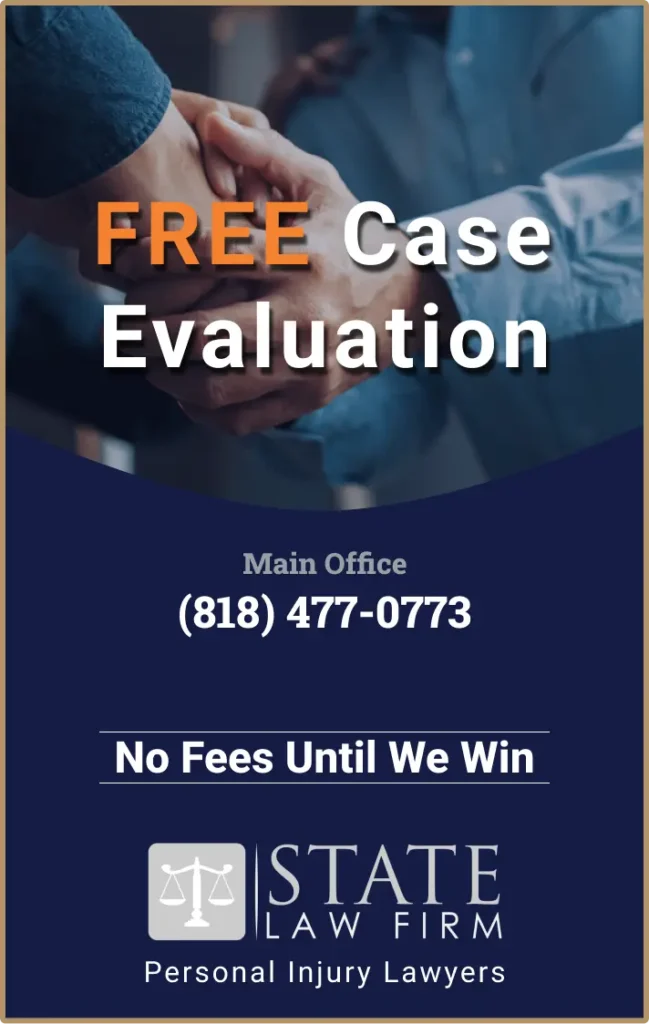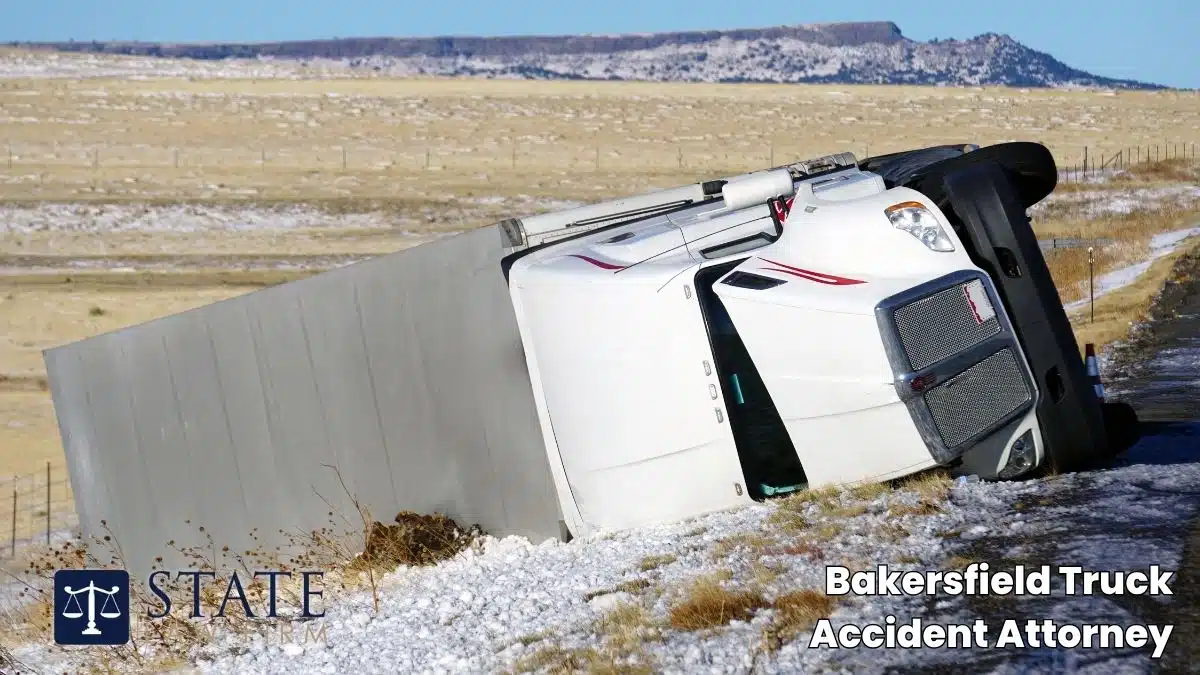
Truck accidents in Bakersfield are among the most severe roadway incidents due to the sheer size and weight of commercial trucks. With major routes like Interstate 5 and Highway 99 running through Kern County, Bakersfield sees heavy truck traffic every day. Unfortunately, when a big rig collides with a smaller vehicle, the results can be devastating. If you or a loved one has been injured in a truck accident in Bakersfield, understanding your legal options is crucial.
At State Law Firm, our team of personal injury attorneys has decades of experience helping accident victims across California. We know what it takes to investigate complex truck accident cases and fight for the compensation you deserve. In this comprehensive guide, we’ll cover why truck accidents are so dangerous, common causes and injuries, how liability is determined, what compensation you can claim, and how a Bakersfield truck accident attorney can help protect your rights.
Why Truck Accidents Are Especially Dangerous
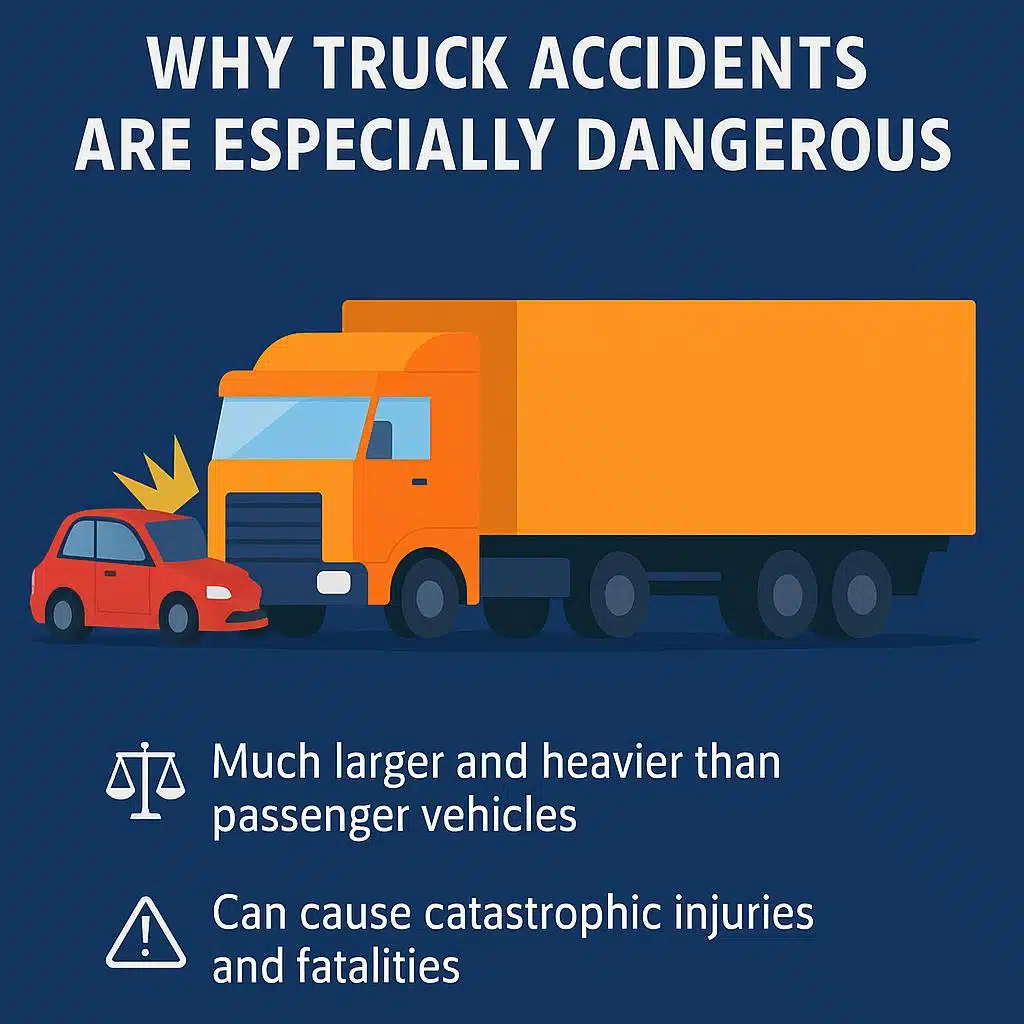
Trucks are substantially larger, taller, and heavier than regular passenger vehicles. A fully-loaded commercial semi-truck can weigh up to 80,000 pounds, whereas the average car weighs around 3,000 pounds. This extreme weight disparity means that in a collision, smaller vehicles and their occupants absorb the brunt of the impact, often resulting in catastrophic injuries or even wrongful death. In fact, truck crashes frequently lead to catastrophic injuries (life-altering harm such as spinal cord damage or brain trauma) and fatalities that forever change families’ lives.
Additionally, big rigs have longer stopping distances and large blind spots. They are harder to maneuver, especially on congested city streets or busy highways. Bakersfield’s highways and rural roads alike see extensive truck use for agriculture, oil, and freight transport. A slight lapse in a truck driver’s attention or a mechanical failure can cause a massive accident affecting numerous vehicles. The severity of these crashes is why victims often face long-term disabilities and extensive medical treatment. It’s also why pursuing legal action with the help of experienced attorneys is so important – truck accident cases involve high stakes and complex factors that a skilled lawyer can navigate.
Common Causes of Truck Accidents in Bakersfield
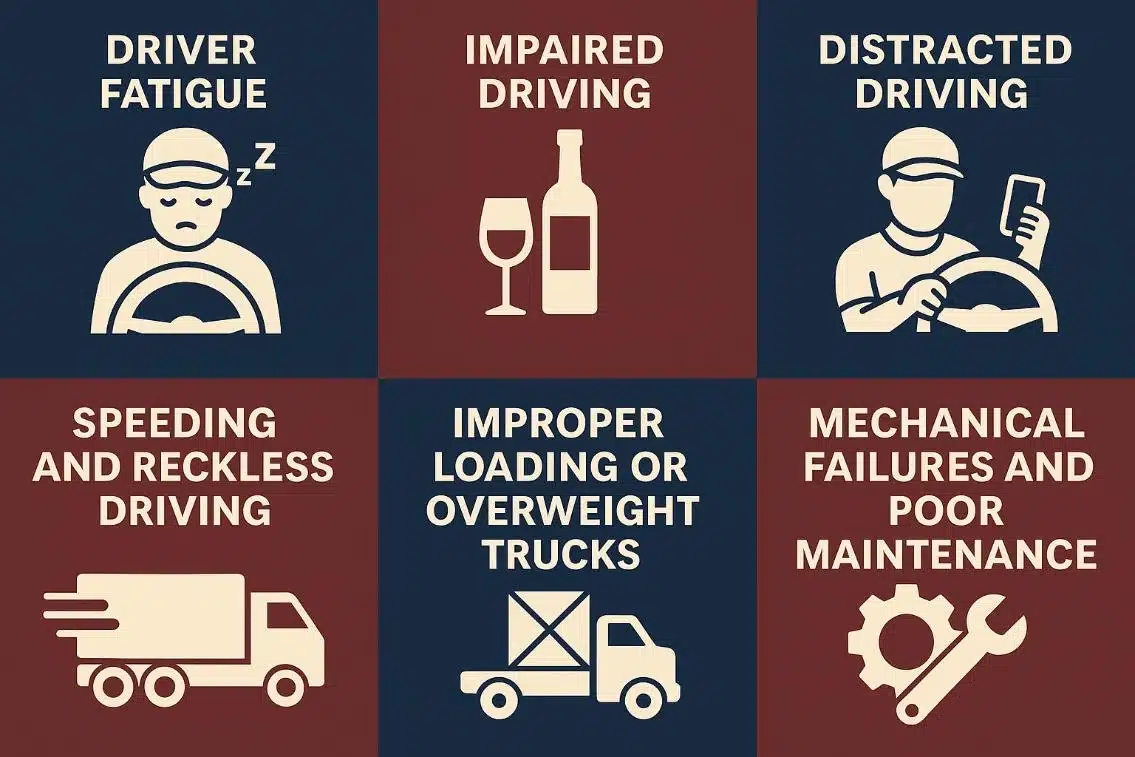
Truck accidents happen for many of the same reasons as other auto accidents, but some causes are especially prevalent in commercial trucking. In our 25+ years as truck accident lawyers, we’ve seen several common factors that lead to crashes in the Bakersfield area:
- Driver Fatigue: Truck drivers often work long hours on tight delivery schedules. Despite federal Hours-of-Service regulations meant to combat fatigue, violations occur and exhausted truckers remain on the road. Drowsy or fatigued driving slows reaction times and impairs judgment – much like the effects of driving under the influence. In fact, fatigue can be just as dangerous as drunk driving; an over-tired trucker may drift into other lanes or fail to brake in time, causing a serious collision. (Federal rules limit driving hours, but not all drivers or companies adhere to them.)
- Impaired Driving: Driving a commercial truck while under the influence of alcohol or drugs is illegal and extremely dangerous. Truck drivers hold commercial licenses with stricter standards (for example, a lower legal blood alcohol limit). Any impairment greatly increases the risk of a crash given a truck’s size and momentum. Whether it’s alcohol, illicit substances, or even prescription medications that affect alertness, impaired truck drivers put everyone on the road at risk. (Related: California imposes heavy penalties for DUI – learn more about driving under the influence and legal consequences.)
- Distracted Driving: Long hours on the road can tempt truckers to check phones, text, eat, adjust GPS, or even engage with dispatching devices while driving. Any distraction that takes a driver’s eyes or mind off the road is hazardous, but for a truck driver it can be catastrophic. At highway speeds, even a few seconds of distraction can prevent a trucker from braking in time to avoid a crash. Texting or using a smartphone behind the wheel is a major culprit. California law bans handheld device use for all drivers, yet distracted driving remains a leading cause of accidents. (For example, even something seemingly minor like wearing earbuds can be dangerous while driving – see our guide on wearing earbuds while driving in California to understand why.)
- Speeding and Reckless Driving: Tight delivery deadlines and pressure from trucking companies can push drivers to exceed speed limits or drive aggressively. A speeding 18-wheeler is harder to control and requires much longer stopping distance. Reckless behaviors like tailgating, frequent lane changes, or not adjusting speed for road conditions often lead to loss of control. Bakersfield’s highways (such as 99 and 58) see heavy truck traffic, and when drivers speed or drive aggressively, the likelihood of multi-vehicle accidents goes up. These kinds of unsafe practices can easily cause rollover crashes, jackknife accidents, or deadly T-bone collisions at intersections.
- Improper Loading or Overweight Trucks: Tractor-trailers must be loaded according to strict weight and balance guidelines. If cargo is not secured properly or a truck is overloaded beyond legal weight limits, the load can shift dangerously in transit. This may cause the trailer to sway or the driver to lose control, resulting in overturns or spillages on the roadway. Bakersfield sees many agricultural and oilfield trucks hauling heavy loads – if those loads are improperly secured, everyone on the road is in jeopardy. In some cases, faulty loading is done by a third-party company, which introduces additional parties who may be liable for an accident. (Improper loading often leads to complex liability issues involving trucking companies and cargo loaders – see our discussion on handling complex liability issues in multi-vehicle accidents for more insight.)
- Mechanical Failures and Poor Maintenance: Big rigs log thousands of miles and require regular maintenance to stay safe. When a trucking company or owner-operator fails to properly maintain brakes, tires, steering systems, or trailer hitches, the odds of a catastrophic failure increase. For example, blown tires can cause a driver to lose control, and brake failures can lead to runaway trucks incapable of stopping. In many accidents, we discover that negligence in maintenance – such as skipping brake replacements or ignoring engine warning signs – played a role. In other cases, a defective part on the truck (like a faulty brake line or hitch component) may give out and cause a crash. (Manufacturers and maintenance providers can be held accountable for defective equipment – see our resource on defective product lawsuits to learn how companies are held responsible for unsafe parts.)
- Other Factors: Weather conditions (like Tule fog common in the Central Valley), poor visibility, or hazardous road conditions can also contribute to truck accidents. However, even in these cases, a careful and well-trained driver should adjust and drive prudently. Often, crashes that occur in bad weather still come down to some form of negligence (e.g., driving too fast for conditions).
Severe Injuries Resulting from Truck Accidents
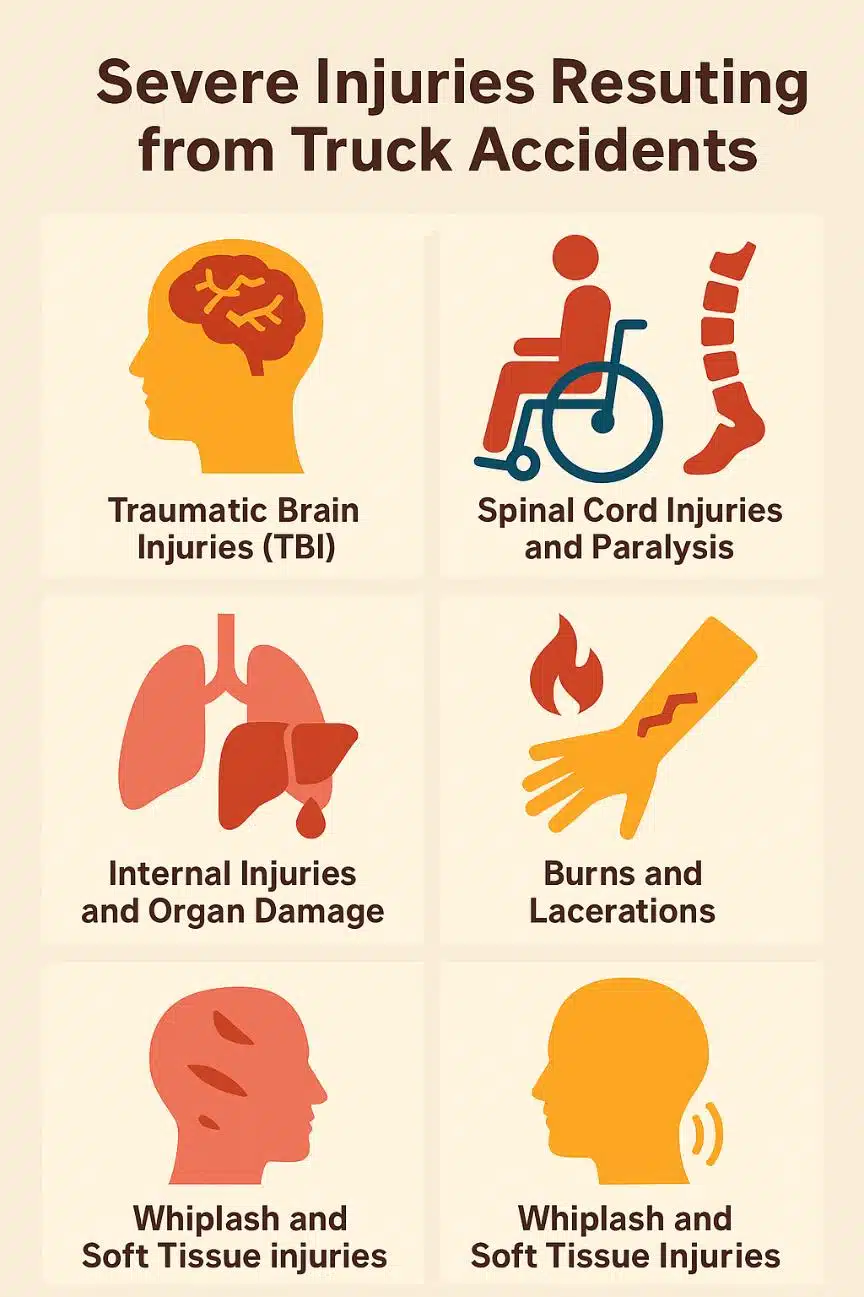
Because of the massive forces involved in a truck collision, victims often suffer severe, life-changing injuries. Our firm has helped clients recover compensation for a wide range of injuries from Bakersfield truck crashes. Some of the most common include:
- Traumatic Brain Injuries (TBI): The impact of a truck accident can cause a violent jolt or blow to the head, leading to concussions, contusions, skull fractures, or severe brain trauma. TBIs may not always be immediately obvious at the scene, but they can result in cognitive impairments, memory loss, personality changes, and other long-term neurological effects. Victims with serious brain injuries often require extensive rehabilitation or even lifelong care. (Learn more about the long-term effects of traumatic brain injury and what symptoms to watch for after an accident.)
- Spinal Cord Injuries and Paralysis: The force of a truck crash can crush or sever the spinal cord, leading to partial or complete paralysis. Injuries to the neck or back may result in conditions like paraplegia or quadriplegia, where the victim loses use of limbs and vital bodily functions. These are catastrophic injuries requiring a lifetime of medical treatment, adaptive equipment, and personal care. Even less severe back injuries (like herniated discs or vertebral fractures) can cause chronic pain and mobility issues. (Our paralysis injury lawyers understand the immense challenges spinal injury victims face and can help pursue compensation for long-term needs.)
- Broken Bones and Orthopedic Injuries: The impact forces in a truck crash frequently cause multiple fractures. It’s common for victims to suffer broken legs, shattered pelvises, rib fractures, or complex fractures that require surgical repair with pins, plates, or screws. Recovering from multiple broken bones can take months or years, often involving surgeries, physical therapy, and rehabilitation. In some cases, injuries are so severe that amputation of a crushed limb is necessary.
- Internal Injuries and Organ Damage: The blunt force trauma from a collision may damage internal organs or cause internal bleeding. Injuries to the spleen, liver, kidneys, lungs, or other organs can be life-threatening and aren’t always immediately apparent. Victims might feel “fine” right after an accident but experience dangerous symptoms later. Prompt medical evaluation is critical after any high-impact crash to diagnose internal injuries. (Internal organ damage can have serious, permanent effects – read about how our firm approaches cases involving internal organ injuries and securing necessary compensation.)
- Burns and Lacerations: If a truck’s fuel tank is ruptured or hazardous cargo ignites, a post-collision fire or explosion can cause severe burn injuries. Burn victims often endure excruciating pain, risk of infection, scarring, and disfigurement. They may require specialized burn unit care, skin graft surgeries, and long-term rehabilitation. Even without fire, shattered glass and jagged metal can cause deep lacerations or degloving injuries. These wounds can lead to significant blood loss and permanent scarring. (For a deeper look at burn injury cases and damages, see our explainer on California burn injury legal rights.)
- Whiplash and Soft Tissue Injuries: Not every injury from a truck accident is visible on an X-ray. Many victims suffer severe whiplash, torn ligaments, or muscle and tendon damage due to the sudden jolting motion of a crash. Soft tissue injuries can be extremely painful and may limit mobility, sometimes developing into long-term conditions. While these injuries might be labeled “minor” compared to catastrophic ones, they are still compensable and can significantly impact a person’s quality of life.
- Emotional Trauma: Surviving a violent truck accident can be emotionally devastating. It’s not uncommon for victims (and their families) to experience post-traumatic stress disorder (PTSD), anxiety, depression, or persistent nightmares and flashbacks of the crash. The psychological toll of the accident – especially if one has sustained disfiguring injuries or disability – can require therapy and support for a long time. Emotional and psychological injuries are very real and are considered non-economic damages in a personal injury claim.
Each of these injuries can lead to substantial medical bills and other losses. It’s important to seek immediate medical attention after a truck accident, even if you feel okay, because some injuries (like internal bleeding or concussions) may not show symptoms right away. Documenting your injuries with medical records is also vital for any legal claim you pursue later.
Determining Liability in a Truck Accident Case
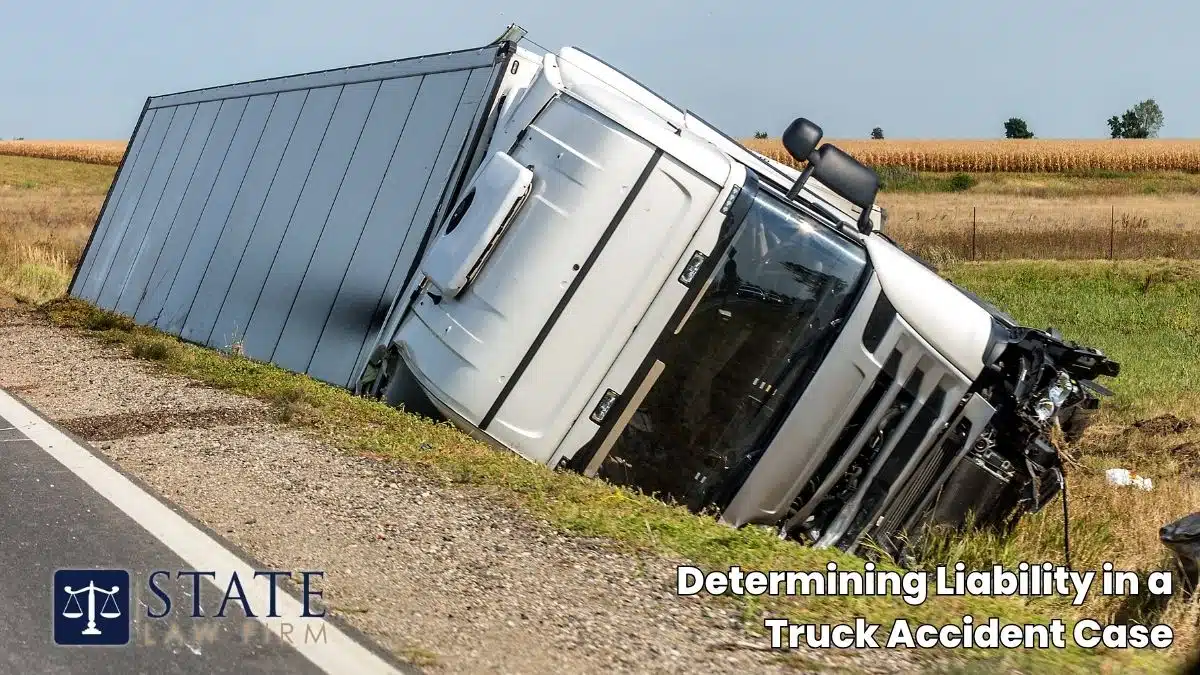
One reason truck accident claims are more complex than a typical car accident is that multiple parties may be legally responsible. Identifying all the liable parties is key to ensuring you can recover full compensation for your damages. Here are the parties commonly involved in a truck accident and how they may share liability:
- Truck Driver: In many cases, the truck operator’s negligence is a primary cause of the accident. If the driver was speeding, driving while distracted, impaired, or violated safety regulations (like hours-of-service rules or weight limits), they can be held liable for the crash. Truck drivers have a duty to operate safely; when they breach that duty through reckless or careless behavior, they are responsible for the harm that results.
- Trucking Company (Carrier): The company that employs the driver (or owns the truck) often shares responsibility under the legal doctrine of vicarious liability – employers are accountable for the actions of their employees on the job. Beyond that, a trucking company may also be directly negligent in hiring or training the driver, setting unrealistic schedules that encourage speeding, or failing to maintain their fleet. If a company allowed an unqualified or dangerous driver on the road, or ignored maintenance issues, it can be held liable for accidents that result. (Companies cannot dodge accountability for their drivers’ actions. Learn how employer accountability works in our article on vicarious liability.)
- Truck Owner or Maintenance Provider: Sometimes the truck or trailer is owned by a different entity than the trucking company or driver. There are cases where a leasing company owns the tractor, or an independent maintenance contractor services the vehicle. If poor maintenance (worn brakes, bad tires, etc.) contributed to the crash, the party responsible for maintaining the truck can be liable. For example, if a maintenance company signed off on a brake inspection that was never properly done, they could share fault for an ensuing brake failure accident.
- Cargo Loading Company: If the truck was loaded by a third-party loading service or at a shipping warehouse, that company could be responsible for improperly loading or securing the cargo. As noted, shifting or spilled cargo due to negligent loading can directly cause accidents (rollovers, jackknifes, debris hitting other cars). In such scenarios, the loading company may be liable for the damages alongside the driver and carrier.
- Truck or Parts Manufacturer: Defective truck components (such as tire blowouts from a tire defect, brake failures from design flaws, or a faulty coupling hitch) can cause or worsen accidents. In these cases, the manufacturer of the truck or specific part can be held accountable under product liability laws. Pursuing a product liability claim involves showing the part was defectively designed or manufactured and that defect led to the accident. (Our firm is experienced in holding manufacturers accountable for unsafe products – see how product liability lawsuits play a role in injury cases.)
- Other Motorists: Occasionally, another car on the road may have done something to set off the chain of events. For instance, if a reckless driver cut off a truck and caused the truck to swerve and crash, that third-party driver might share blame. It’s important to investigate whether another vehicle (even one not directly struck) played a role in the accident. Witness statements and traffic camera footage can help identify if a “phantom driver” contributed to the crash.
- Government or Road Authority: If a hazardous road condition (like an obscured stop sign, malfunctioning traffic light, or badly designed interchange) contributed to the wreck, the government entity responsible for road maintenance could be partially liable. Suing a government agency involves special procedures and shorter time deadlines (in California, often a claim must be filed within 6 months). While these cases are challenging due to sovereign immunity rules, they are not impossible – governments can be held liable for negligence just like private parties in certain situations.
Comparative Fault in California: It’s worth noting that more than one of the above parties can be at fault, and California’s comparative negligence laws allow liability (and compensation) to be divided among multiple parties. Even if you, as the injured victim, are found to be partially at fault (for example, perhaps you were speeding a bit or made an imperfect driving decision), you can still recover damages. California follows a “pure comparative negligence” rule, meaning your compensation would simply be reduced by your percentage of fault. For instance, if you are found 20% at fault, you can still recover 80% of your total damages. Never assume that being partially to blame prevents you from seeking compensation – these determinations are complex, and our attorneys can often overcome unfair blame-shifting tactics. (For a deeper explanation of how fault is allocated, read our guide on modified comparative negligence and how it differs from California’s pure comparative system.)
Identifying all potential defendants is crucial. Our Bakersfield truck accident attorneys will conduct a thorough investigation to determine exactly how the crash happened and who had a hand in causing it. This can involve reviewing driver logbooks, subpoenaing maintenance records, downloading “black box” data from the truck, obtaining surveillance or dashcam videos, and consulting accident reconstruction experts. We leave no stone unturned because holding all liable parties accountable maximizes your chances of a full financial recovery.
What Compensation Can Truck Accident Victims Recover?
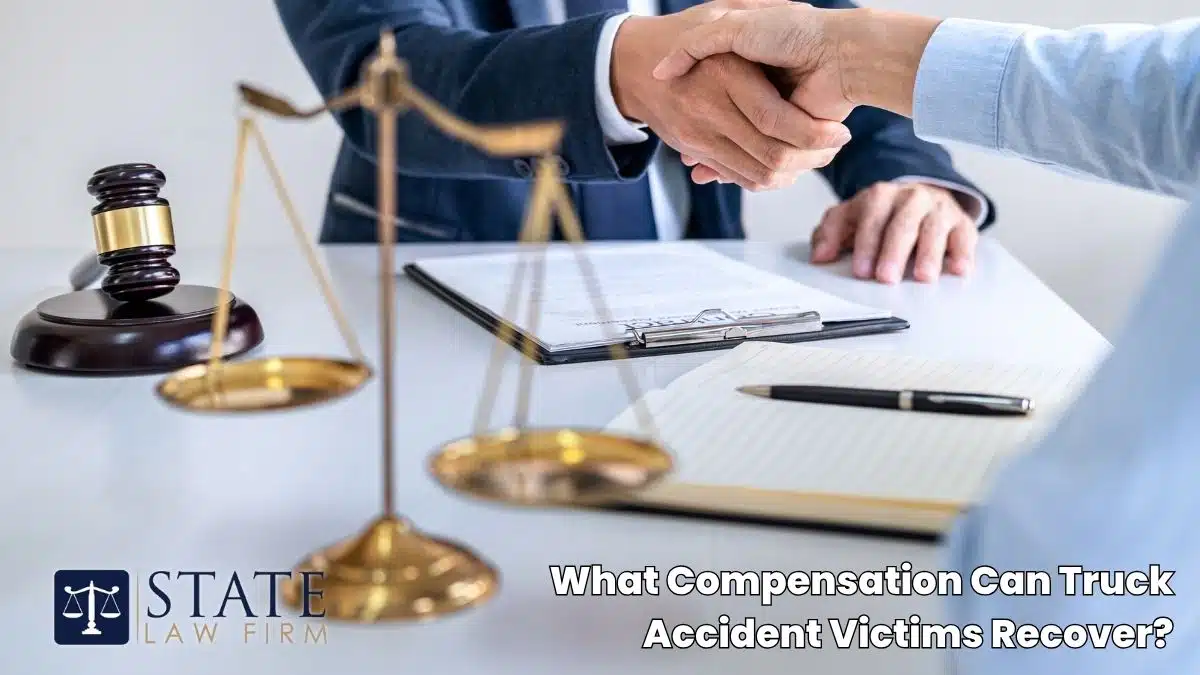
A truck accident can turn your life upside down in an instant. Through a personal injury claim or lawsuit, victims are entitled to seek financial compensation for all losses resulting from the crash. These losses (known in legal terms as “damages”) can be both economic and non-economic. In a successful truck accident claim, you may recover compensation for:
- Medical Expenses: This includes all medical bills stemming from the accident – emergency room visits, hospital stays, surgeries, doctor’s appointments, prescription medications, medical equipment (braces, wheelchairs, etc.), physical therapy, rehabilitation programs, and any future medical care you will need. Given the severe injuries trucks cause, future medical costs can be substantial (e.g., ongoing therapy or future surgeries). It’s critical to account for future treatment in addition to bills already incurred.
- Lost Wages and Loss of Earning Capacity: If your injuries force you to miss work during recovery, you can claim compensation for those lost wages or salary. For more serious injuries that affect your long-term ability to work, you can also claim loss of earning capacity – essentially the income you likely would have earned in the future if the injury had not happened. For example, if a permanent injury prevents you from returning to your job or advancing in your career, the projected difference in your earnings can be recovered. This often requires expert analysis to calculate, and our attorneys frequently work with economists and vocational experts to document these losses.
- Property Damage: Don’t forget that you can recover the cost to repair or replace your vehicle (or other personal property) damaged in the accident. A high-impact truck crash can easily total a car. You are entitled to the fair market value of your vehicle if it’s a total loss, or the reasonable repair costs if it can be fixed. Rental car costs while you’re without your vehicle may also be included.
- Pain and Suffering: These are non-economic damages intended to compensate you for the physical pain and discomfort you’ve endured, as well as the mental anguish that accompanies serious injuries. There’s no exact price tag on pain and suffering – it encompasses everything from the actual pain of injuries and treatments, to loss of enjoyment of life, to the inconvenience and hardship of dealing with injuries. Truck accident victims often experience significant pain (from broken bones, surgeries, etc.) and a lengthy recovery filled with challenges. Our legal team will help illustrate to the insurance company or jury the extent of your suffering. (Proving intangible losses can be challenging – see our tips on how to prove pain and suffering in a personal injury case.)
- Emotional Distress and Mental Trauma: Separate from general pain and suffering, the psychological impact of a truck crash can be profound. Many clients develop PTSD symptoms – such as flashbacks, sleep issues, or fear of driving – that require therapy or counseling. Depression, anxiety, and emotional distress often go hand-in-hand with severe injuries (for instance, adjusting to paralysis or disfigurement is emotionally traumatic). These damages recognize the mental health treatment costs and the very real emotional toll the accident has taken on your life. (Learn about specific considerations in emotional distress claims after car accidents – many principles apply similarly to truck accident cases.)
- Permanent Disability or Disfigurement: If the accident left you with a permanent impairment (such as paralysis, limb loss, scarring, or other disability), additional compensation is warranted for the impact on your quality of life. This includes loss of mobility, loss of function, and the psychological impact of disfigurement. These life-altering consequences are often reflected in higher awards for pain and suffering.
- Loss of Consortium: If your injuries significantly affect your relationship with your spouse or family, your close family members may have a claim for loss of consortium. This compensates for loss of love, companionship, care, or intimacy due to your injuries. For example, a spouse can claim loss of consortium if the accident’s aftermath strains the marriage or changes the relationship fundamentally. While this is a separate derivative claim, it often accompanies severe injury cases. (For more on this, see our overview of loss of consortium in personal injury cases.)
- Wrongful Death Damages: Tragically, many truck crashes are fatal. If you lost a loved one in a Bakersfield truck accident, you may pursue a wrongful death claim. Eligible family members (such as a spouse, children, or dependents) can recover compensation for funeral and burial expenses, the loss of the loved one’s financial support and benefits, the value of their household services, and the loss of companionship and guidance that person provided. While no amount of money can fill the void, wrongful death claims seek to ease the financial burden on families and hold the negligent parties accountable. (Our wrongful death lawyers handle these sensitive cases with compassion and determination to obtain justice for grieving families.)
- Punitive Damages: In certain truck accident cases, California law allows for punitive damages. These are awarded not to compensate the victim for losses, but to punish the wrongdoer and deter especially egregious conduct. Punitive damages might come into play if, for example, a trucking company willfully ignored safety regulations (knowingly putting a dangerously unqualified driver on the road) or if a truck driver was extremely reckless (such as driving under the influence or engaging in a road-rage incident that caused the crash). Punitive damages require a showing of gross negligence, fraud, or malice. While they are not available in every case, we will certainly explore whether the facts of your accident justify pursuing them. (For an overview of how punitive damages work in California, check out our guide to punitive damages.)
Every truck accident case is unique. Part of our job as your attorneys is to fully assess all the damages you have suffered – including those you might not immediately recognize. We work closely with medical professionals to understand your prognosis and with financial experts to calculate future losses. This comprehensive approach ensures when we make a demand for compensation, it truly reflects everything you’re entitled to under the law. It’s also worth noting that California does not cap damages in personal injury cases (except in medical malpractice), so there is no arbitrary ceiling on what you can recover from the at-fault parties and their insurers, aside from insurance policy limits and the defendants’ ability to pay.
How a Bakersfield Truck Accident Attorney Can Help You
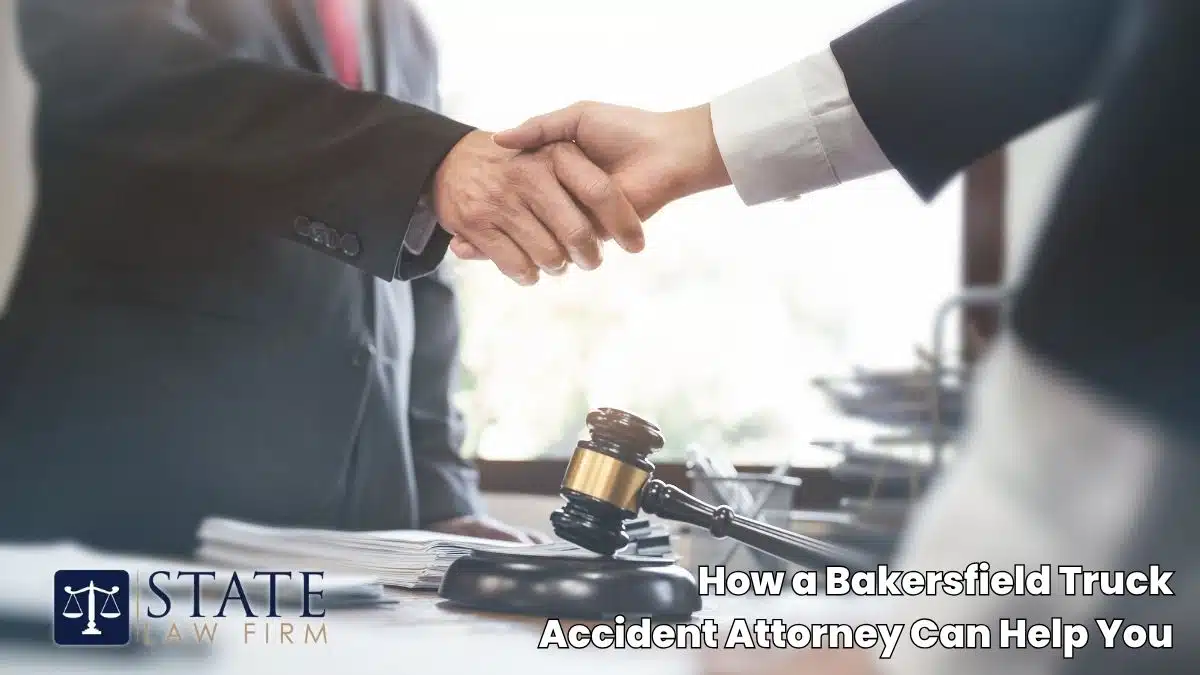
If you’ve been involved in a truck accident, you’re likely dealing with pain, stress, and uncertainty about what to do next. Trucking companies and their insurers often act quickly to protect their interests – sometimes sending investigators to the scene right away and reaching out to victims with quick settlement offers to minimize payouts. This is why having a skilled Bakersfield truck accident attorney on your side as early as possible is so important. Here are several ways our State Law Firm attorneys can assist you after a truck accident:
1. Immediate Investigation and Evidence Preservation: Time is of the essence in truck accident cases. Crucial evidence can “disappear” if not promptly secured – for example, a trucking company might repair the vehicle and erase electronic data, or an onboard dashcam might be overwritten. Our legal team will jump into action to preserve evidence. We can send spoliation letters to the trucking company to preserve the truck and its black box data (which records speed, braking, and hours of service). We gather police reports, photographs of the scene and vehicles, and witness statements. If there were traffic or surveillance cameras in the area, we’ll work to obtain that footage. We may also download data from the truck’s Electronic Logging Device (ELD) to check for hours-of-service compliance. By conducting a thorough, independent investigation, we build a strong foundation for your claim while you focus on your recovery. (Wondering how to get evidence like camera footage? See our guide on obtaining traffic camera footage after an accident for steps we can take.)
2. Determining Fault and Liability: As discussed, multiple parties could be at fault in a truck accident. Our attorneys will analyze all the evidence to figure out exactly how the crash happened and who should be held responsible. We often collaborate with accident reconstruction experts who can use physics and engineering principles to recreate the crash and assign fault. If needed, we’ll also dig into the trucking company’s background – checking for prior safety violations, examining maintenance logs, and reviewing the driver’s training and driving record. This comprehensive approach allows us to pursue claims against all liable parties, whether that’s the driver, employer, manufacturer, or others. By not leaving anyone out, we help ensure you have access to the maximum compensation available.
3. Handling Insurance Companies (Protecting Your Claim): After a truck accident, you might be contacted by insurance adjusters for the trucking company or other parties. Do NOT give a recorded statement or sign anything from an insurance company without consulting your lawyer. Insurers – even your own auto insurer – may try to minimize your claim or get you to settle quickly for a low amount. Our firm will handle all communications and negotiations with the insurance companies involved. We have extensive experience dealing with large commercial insurers and know the tactics they use, such as disputing liability or downplaying your injuries. By letting us speak for you, we can protect your rights and keep you from accidentally saying something that could hurt your case. We’ll also make sure the insurance companies play fair. (For insight into insurance tactics, read about the role of insurance companies in personal injury cases – knowledge is power when facing adjusters.)
4. Calculating the True Value of Your Claim: One of the most important roles of a truck accident attorney is to accurately value your claim. This includes tallying up all economic losses (medical bills, rehab, lost income, etc.) and assigning appropriate amounts to non-economic losses (pain, suffering, emotional distress, etc.). We often work with medical experts to understand the extent of your injuries and whether you will need future care or have any permanent limitations. We’ll also consult life care planners for catastrophic injury cases to project future medical and living expenses, and economists to quantify lost earning capacity. By presenting a thorough calculation of damages, we put you in a strong position during settlement talks. Insurance companies respect claims that are well-documented with evidence and expert support – it forces them to take your demand seriously. Our goal is to ensure no component of your loss is overlooked. For example, if you’ll require home modifications due to a disability, or if you need vocational training to start a new career, we incorporate those costs into our valuation.
5. Negotiating Aggressively and Seeking Fair Settlements: The majority of truck accident claims are resolved through settlements rather than trials. We will prepare a compelling demand package for the insurance carriers, including all evidence of liability and documentation of your damages. Our attorneys are seasoned negotiators who won’t accept a lowball offer. We will advocate fiercely to get you the maximum compensation possible through settlement. This often involves multiple rounds of negotiation. Throughout the process, we keep you informed and provide guidance on when an offer is fair or when we believe we should push for more. Remember, the insurance companies have their own lawyers and adjusters looking out for their bottom line – you need an experienced advocate to level the playing field.
6. Litigation and Trial Representation: If the insurance company refuses to offer a reasonable settlement, we will not hesitate to file a personal injury lawsuit on your behalf. Filing a lawsuit can apply additional pressure on the defendants to settle, but if they still won’t do right by you, our trial attorneys are fully prepared to take your case to court. We have extensive courtroom experience and a track record of success in litigating complex accident cases. During litigation, we handle all aspects of the process – drafting legal pleadings, handling discovery (obtaining evidence from the other side), taking depositions of witnesses and experts, and representing you in all pre-trial hearings. As the case moves forward, there may be opportunities to mediate or negotiate a settlement. But if needed, we will present a persuasive case to a jury in Kern County to seek a verdict in your favor. You pay nothing upfront – our firm works on a contingency fee, which means we only get paid if and when we win compensation for you, whether by settlement or verdict. This aligns our interests with yours: we’re motivated to get you the best possible outcome.
7. Providing Compassionate Guidance and Support: Beyond the legal strategy, a good truck accident attorney provides peace of mind. We know how overwhelming the aftermath of a serious accident can be. From day one, we take the burden of the legal battle off your shoulders. We can also assist with practical matters like recommending doctors or specialists, helping you get your car repaired, or explaining how medical liens and health insurance will be handled. Our team truly cares about our clients’ well-being – we strive to treat you like family, keeping you updated on your case and answering any questions you have along the way. While you focus on healing, we focus on winning your case.
In short, having an experienced Bakersfield truck accident lawyer in your corner greatly increases your chances of a successful claim. Trucking companies have powerful insurers and legal teams working to minimize payouts – you deserve equally strong representation fighting for your best interests. Don’t go it alone after a devastating truck accident. There’s too much at stake, from getting proper medical care to securing your financial future after the crash.
California Truck Accident Laws and Deadlines to Know
After a truck accident in Bakersfield, it’s important to be aware of the legal timeframe and laws that could affect your case:
- Statute of Limitations: In California, the statute of limitations for personal injury cases (including truck accidents) is generally two years from the date of the accident. This means you have a two-year window to file a lawsuit against the at-fault parties. If you miss this deadline, you’ll likely lose your right to seek compensation in court. There are some exceptions – for example, if your claim is against a California government entity (for negligence in road maintenance, etc.), you must file a special administrative claim within 6 months of the incident, and follow specific procedures. Also, if the injured person is a minor, the two-year clock may not start until they turn 18. It’s crucial not to delay taking action. Investigating and building a truck accident case can take time, so the sooner you consult an attorney, the better. (For more details on filing deadlines, see our article on the statute of limitations for personal injury in California.)
- Reporting the Accident: California law requires that any traffic accident involving injury or significant property damage be reported to the authorities. In a serious truck crash, it’s almost certain the police will be called to the scene. The responding officers will create an accident report (CHP or local police report) documenting the details and their initial assessment of fault. Be sure to obtain a copy of this report for your records. You are also required to report an injury accident to the DMV within 10 days by submitting a Form SR-1 (your attorney can assist with this). Our team can help ensure all required reports are properly filed.
- No-Fault vs. At-Fault: California is an at-fault state (not a no-fault state) for auto accidents. This means that the driver or party responsible for causing the accident is liable for the damages. You are not limited to only using your own insurance; you can pursue a claim against the negligent truck driver and their company/insurer directly. This is beneficial to California victims because commercial trucks usually carry high liability insurance limits (often $1 million or more), which can cover extensive damages. (Curious about what “no-fault” means? See our guide on no-fault auto accident rules to understand why California allows you to seek full damages from the at-fault party.)
- Special Trucking Regulations: The trucking industry is governed by many federal and state regulations designed to promote safety. These include Hours-of-Service rules (to prevent driver fatigue), weight limits, vehicle inspection requirements, and rules on drug/alcohol testing for drivers. When truck accidents happen, violations of these regulations often come to light. A violation itself can be evidence of negligence. For example, if we discover through driver logbooks that the trucker exceeded the legal driving hours, that strengthens the case that fatigue contributed to the crash. Similarly, California has specific rules for trucks on certain roads (for instance, lane restrictions or lower speed limits for trucks on some highways). An experienced attorney will be well-versed in these laws and know how to leverage any violations to prove fault.
- Evidence from the Truck (Black Box & More): Modern commercial trucks typically have an Event Data Recorder (EDR), often called a “black box,” which records technical information about the truck’s operation (speed, brake usage, engine RPMs, etc.) around the time of a crash. They may also have onboard GPS and communication systems that log data. Under federal law, trucking companies are supposed to preserve certain data after a crash, but data can be lost if not requested in time. We send formal requests to preserve and obtain this electronic evidence. The data can provide an objective picture of what the truck was doing pre-crash (for example, if there was a sudden deceleration or no braking at all). This can corroborate witness accounts or help explain the cause of the accident. We also examine the truck’s maintenance and inspection records for evidence of negligence.
Knowing the law and deadlines is vital, but you don’t have to navigate these alone. When you hire our firm, we will track all deadlines and legal requirements for you, making sure your case complies with California law at every step.
Contact Our Experienced Truck Accident Attorneys Today
A truck accident can leave you facing severe injuries, mounting medical bills, time off work, and a great deal of pain and uncertainty. You don’t have to go through this difficult time on your own. Our compassionate and skilled Bakersfield truck accident attorneys are here to help from start to finish. We will fight to hold the negligent parties accountable and pursue the full compensation you need to rebuild your life.
At State Law Firm, we pride ourselves on providing personalized, client-focused representation. When you work with us, you’ll get big firm results with small firm attention. We have recovered millions for accident victims across California, and we have the resources to take on large trucking companies and insurance carriers. You can see examples of our successes in our case studies and read feedback from past clients in our testimonials – we are committed to achieving the best outcomes for those we represent.
No Fees Unless We Win: We handle truck accident cases on a contingency fee basis. This means it costs you nothing upfront to hire us, and we only get paid if we secure a settlement or verdict in your favor. Our fee is a percentage of the recovery, agreed upon in advance. If we don’t win, you owe us nothing for our services. This arrangement allows anyone, regardless of financial situation, to obtain top-tier legal representation after a serious accident.
Get a Free Consultation: If you or a loved one has been injured in a truck accident in Bakersfield, don’t wait to seek legal advice. Contact us today for a free consultation. We will review the details of your accident, answer your questions, and outline your options – with no obligation. You can call our office or simply fill out our quick online form, and we’ll reach out to you. We understand that you may be in pain or dealing with difficult circumstances, so if you can’t come to us, we can arrange to visit you at home or in the hospital.
Remember, time is critical after a truck accident. Important evidence can fade, and the clock starts ticking on your ability to file a claim. By getting an experienced lawyer involved early, you give yourself the best chance at a successful outcome. Let us handle the legal complexities, deal with the insurance adjusters, and build a powerful case on your behalf – while you focus on healing and your family.
Serving Clients Across California: Though this guide is focused on Bakersfield, our firm serves clients throughout California. Whether your accident happened in Bakersfield, down in Los Angeles or San Diego, or elsewhere in the state, we can help. Our attorneys have local knowledge of courts from Southern California to the Central Valley. We’ve successfully handled cases in communities like Fresno, Visalia, and beyond. No matter where your truck accident occurred, we’ll bring the full weight of our experience and resources to fight for you.
Don’t face the aftermath of a truck accident alone. A skilled Bakersfield truck accident attorney at State Law Firm is ready to stand in your corner and pursue the justice and compensation you deserve. Contact us today to get started on the road to recovery. Your consultation is free, and we’re here to help 24/7. Let us put our 25+ years of legal expertise to work for you and secure the peace of mind you need during this challenging time.

